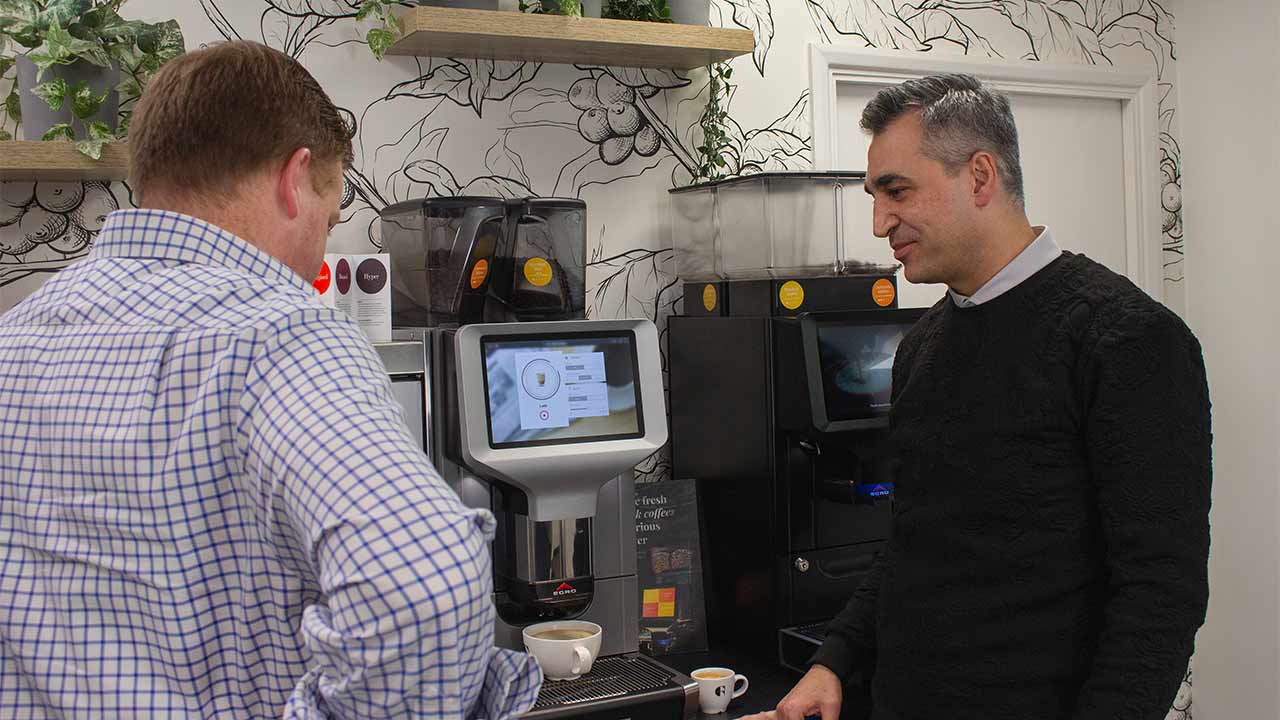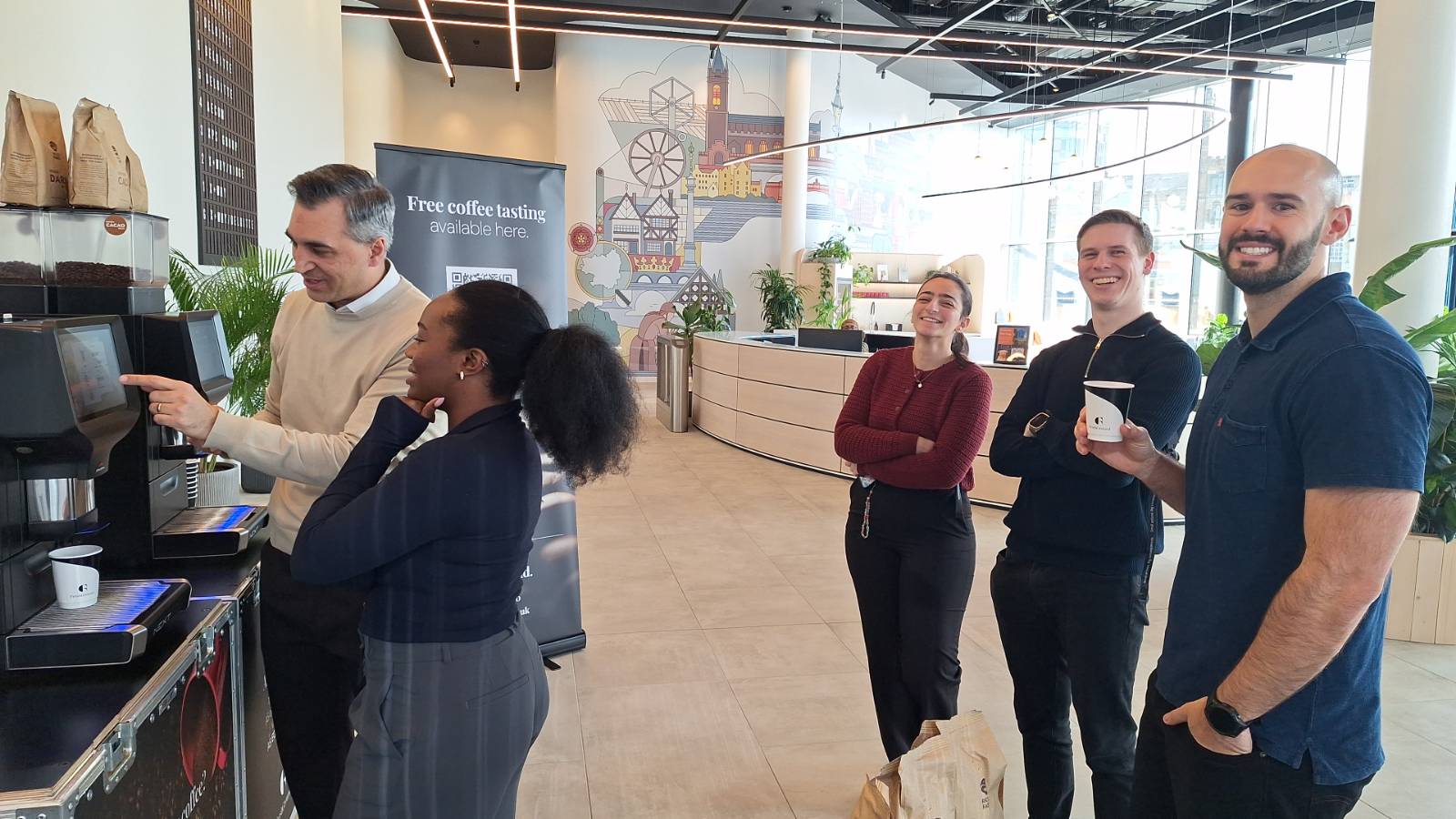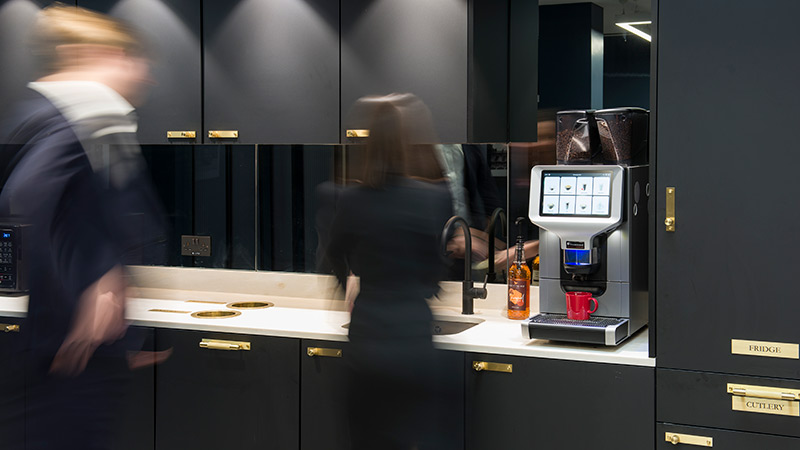Which coffee machine is best for my office size and budget?
Lily Hedley | May 29, 2025 | 9 minute read

Whether your team is small medium or large, and no matter your budget, you will be able to create a coffee solution that keeps everyone happy.
In our opinion, good office coffee doesn’t necessarily mean a barista. In most cases, it just needs the right machine. From compact pod machines to high-capacity commercial systems and in-house cafe setups, we’ve broken it down by team size and weekly spend to help you find your perfect match.
At a glance
| Package | 0–10 people | 10–50 people | 50–100 people | 100 or more people |
|---|---|---|---|---|
| Economical | Pod machine | Pod machine (not sustainable) | Bean-to-cup coffee machine | Bean-to-cup coffee machine |
| Different | Bean-to-cup coffee machine | Bean-to-cup coffee machine | High capacity bean-to-cup coffee machine | High capacity bean-to-cup coffee machine with extras |
| Luxury | Top of the range bean-to-cup coffee machine | Top of the range bean-to-cup coffee machine | Barista on site | Multiple baristas |
Best coffee machine for small offices (1-10 people)
Economical
Single-serve pod brewers (e.g. Nespresso-style) are compact, easy to use, and provide consistent espresso-based drinks at the push of a button. This, paired with a kettle for hot chocolate and tea can cover all the basic needs of an office.
- Assuming a coffee consumption of 2-3 coffees per person per day. 20 – 30 coffees per day, costing £0.30 – £0.45 per pod. There’s a cost of around £7.00 a day or £35 a week for coffee.
- Factoring in maintenance, which costs around £10 monthly for the regular-use products, and electricity, with relatively low consumption at around £2.50 a month.
- A pod machine will usually mean a one time purchase costing between £100-£300.
Different
Bean-to-cup machines can bring café-quality coffee to small teams. They grind fresh beans for each cup, providing superior taste and a broader menu of drinks. These machines involve a little more upkeep but offer better long-term value. You can choose different capacity machines depending on the size of your team. A good choice for a small team would be the JURA GIGA X with the single hopper option.
- You’ll typically spend between £10 and £15 per kilo of coffee beans, and each kilo makes around 90 espressos, so the beans go a long way.
- For an office of 10, you would probably get through a kilo and a bit each week.
- Allow around £7 a week for cleaning products and regular maintenance.
- Electricity use is low, averaging about £5 a month, which comes to £1.25 a week.
- A bean-to-cup machine suitable for a small team usually costs between £36 and £70 per week to rent or lease. This depends on the length of the rental contract of course.
- Your total cost per week might come to somewhere between £54-£89 a week.
Luxury
A top-of-the-range bean-to-cup system not only offers full control over strength, milk, and temperature. It makes a strong statement and gives users a luxury experience. In a small office, a top-of-the-range machine is ideal if you’re using coffee to impress visitors or elevate office culture. An example would be the LaCimbali S15.
- Weekly coffee cost, depending on consumption, would be roughly £17.50 per week.
- Maintenance and cleaning costs average out to around £7 a week.
- Electricity costs around £6 per month (or £1.50 per week).
- Machine rental or lease costs between £80 – £100 per week.
- Total cost per week is around £113 – £133.

Best office coffee solution for offices of 10-50 people
Economical
Pod machines remain a popular choice for teams up to 50. They offer ease of use and broad drink variety, with little cleanup required. The main downside is that the more users you have the more waste you will generate.
- Most offices in this category drink between 20 – 100 coffees a day, which works out to around £14 – £30 daily depending on how many people are drinking and which pods you use.
- Maintenance is minimal and usually costs about £3 a month, and electricity use is low at around £2 a month, so you’re looking at £5 a week combined.
- Most pod machines suitable for small-ish teams cost between £200 and £500 upfront. This is a one-time cost and not included in the weekly running total.
Different
In a small-ish office, a medium capacity automatic coffee machine will show your team that you care about them without breaking the bank. Something like the JURA GIGA X with dual hoppers, which can make up to 150 drinks per day. Or the Egro Qube, which has the same capacity.
- The typical cost of coffee beans is between £10 and £15 per kilo.
- For less than 30 people, you could get away with £10 a week spent on coffee if you bought cheap beans. But for 50 people, you’d be looking at 1.5-2 x Kg of coffee beans, which could cost between £15-£30 a week.
- Machine rental cost per week would be around £78.20 – £92.70 depending on the size of your team, and which add-ons and contract length you choose.
- Total cost per week might be around £96.7 – £131.20.
Luxury
In a small-ish office, a top-of-the-range bean-to-cup machine is ideal if you’re using coffee to impress visitors or really elevate your office culture. In this category, we would also recommend the LaCimbali S15, which can handle up to 200 coffees a day.
- Weekly coffee cost, depending on consumption, would be roughly £30 per week.
- Maintenance and cleaning costs average out to around £7 a week.
- Electricity costs £6 per month (or £1.50 per week).
- Machine rental or lease would be between £80 – £100 per week.
- Total cost per week might be around £118 – £138.

Best coffee solution for medium offices (50-100)
When the team grows past a few dozen, serving capacity is critical. High-capacity bean-to-cup machines grind beans and dispense hot water/milk simultaneously, brewing each cup in about 30 seconds. They can easily crank out espresso, cappuccino and latte after latte, which is important when there are more people in your workplace. Everyone will have different preferences, but won’t want to wait around for ages. You want something that can handle the high-demand days and isn’t going to crack under pressure.
Economical
If your team is between 50 and 60 people, a medium capacity bean to cup coffee machine like the JURA GIGA X or an Egro Qube would suit your workplace and keep costs down. If your team is in the 60-70 person range, then you’re looking at something along the lines of the LaCimbali S15, which would be able to brew up to 200 coffees a day. Any higher and you are looking at a high capacity coffee machine like the Egro Next, which can brew up to 400 coffees a day!
- Coffee still retails for around £10-£15 per 90 coffees.
- Maintenance and cleaning costs average out to around £7 a week.
- Electricity costs £6 per month (or £1.50 per week).
- In these larger team sizes, it can be hard to estimate cost without producing massive ranges. So have a look at the cost calculator tool for each of the aforementioned machines to get a better idea of price for your specific team size.
Different
The ideal machine for those wanting to go the extra mile without breaking the bank is a top-of-the-range bean-to-cup machine. These machines can stand up to heavy usage, have an aesthetically pleasing design and produce barista-quality coffee. You also have the option of adding bonus features to really enhance the user experience. For example, a cup warmer would keep your team’s coffees warmer for longer.
- Short contract with all bells and whistles costs approximately £230 a week.
- Long-term contract and just the machine costs approx. £120 a week.
- Price range for machine costs: £120-£230 a week.
- Plus beans at £30 for every 90 coffees served.
- These machines take fresh milk, which you would also have to cover the cost of.
- Plus maintenance supplies and electricity at £8.50 a week.
Luxury
In medium-sized offices, an in-house barista adds real value by turning the everyday coffee break into a shared, uplifting moment. With teams often spread across departments or hybrid schedules, a central coffee point becomes a natural gathering space that helps build stronger internal connections.
- A dedicated barista service also brings consistency and quality to every cup, and with an office of 50-100, your barista would be very capable of keeping up with demand.
- Your barista would require a salary; between £25k – £30k annually is about the going rate, depending on your location.
- Then hiring an espresso machine and coffee grinder, and all the other equipment. This can cost upwards of £150 a week.
- Your cost would be around £500 per week if you’re paying a barista a £25k annual salary, plus around £150 per week for equipment hire.
- Plus your coffee beans, milk and running costs.

Best coffee solution for large offices (100 upwards)
Economical
For teams of this size, a high-capacity coffee machine is essential. You may even consider having multiple bean-to-cup machines for your office, dotted around your site in communal spaces.
The best way of keeping costs down at this capacity would be to remove any extras from your package. So you would just be looking at the machine and the servicing costs.
This would cost around £120 per week per machine on a long contract, not including coffee beans, milk and running costs (figures for these can be found in earlier sections).
In some cases, where multiple machines are needed on one site, suppliers like FreshGround might offer you a ‘free on loan’ agreement, where you can get the machines for free by meeting your order requirements for large quantities of coffee beans. You can learn more about free loan agreements in this article.
Different
The best solution when you want to go beyond just the basics would be a coffee package with lots of additional features. You can add things like cup warmers, hot chocolate modules, and a special fridge that dispenses different kinds of milk. And then, if you have a particularly large business, you may consider having multiple coffee points.
This sort of solution would cost you about £150 per week per machine, not including coffee beans, milk and running costs (figures for these can be found in earlier sections).
You may still be eligible for a free on-loan agreement. Add-ons would be charged separately.
Explore the cost calculator tool on this page to try out all the different additional features.
Luxury
In larger offices where a personal touch can be lost, having a mini in-house cafe is a great way of creating a communal experience that makes teams feel important. For businesses of this size that want to keep queues short and downtime even shorter, having more than one barista could be the way to go.
- Multiple baristas reduce wait times, keep service professional and can manage multiple machines during busy hours.
- One to two full-time baristas: £960 – £1,140 per week (Two staff with salaries between £25k–£30k each, including employer costs).
- Espresso machines and equipment: from £300 upwards.
- Plus beans and milk costs.
We’ve chosen a medium-length rental contract as the basis for our cost calculations, but you can price up your own coffee machines on our website. You can also read more about the market price of coffee here.
Finding the right coffee solution for your office doesn’t need to be complicated. Whether you’re a small team looking for a convenient pod setup or a large organisation creating a café-style hub, there’s a machine and pricing structure to suit. The key is to match your choice to your priorities: speed, quality, and experience. It’s worth considering not just the upfront cost, but also the long-term impact on team culture and productivity. Use our cost calculator to tailor your solution, or speak to us directly for personalised advice.
You might find these articles interesting:
How much does an office coffee machine cost in 2025?
In-office barista VS office coffee machine: UK workplace comparison
5 benefits of bean-to-cup coffee machines for modern office environments
Coffee machine customer story